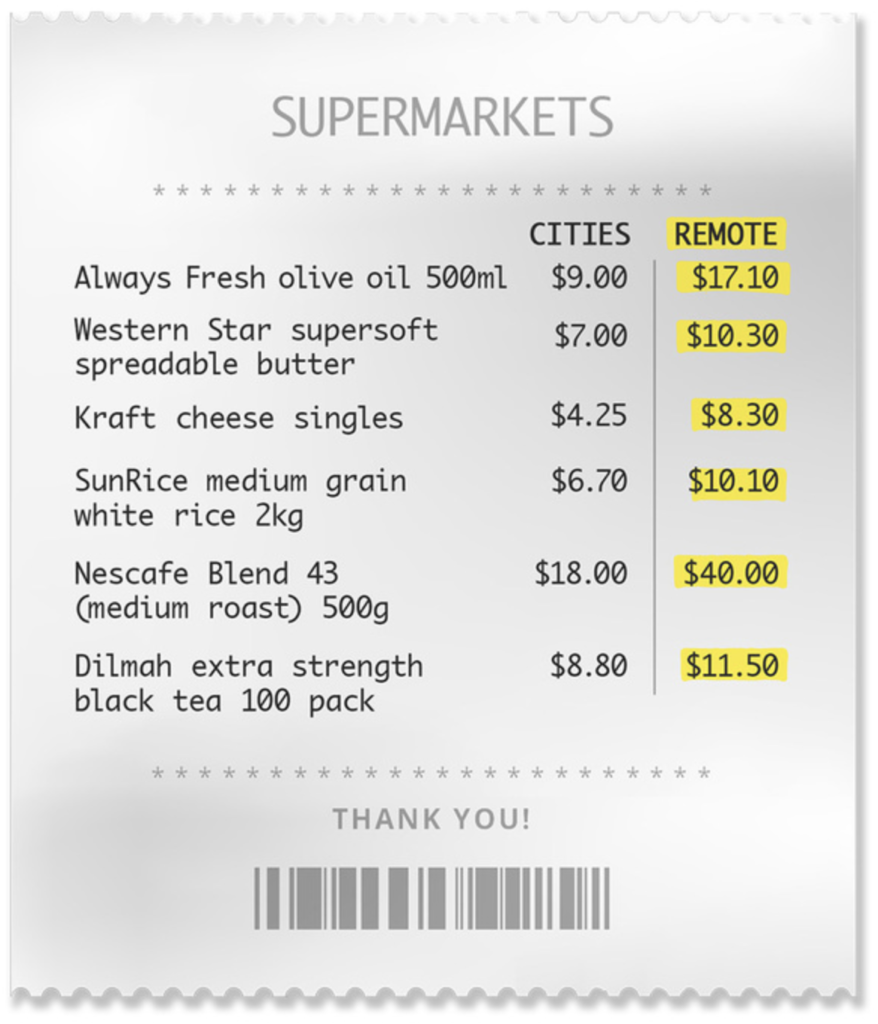
Photo Credit: GetUp
Strengthening Food Security in Remote First Nations Communities
ICAN is united with CHOICE, Community Credit Legal Service Western Australia (CCLSWA), Financial Counselling Australia (FCA), Financial Rights Legal Centre (FRLC), and Mob Strong Debt Help, in supporting the proposed National Strategy for Food Security in Remote First Nations Communities.
We believe this Strategy is a significant step forward in addressing the critical issue of food security in remote areas. However, while we applaud the Strategy’s intentions, we see opportunities for further enhancements that could make an even greater impact.
Access to affordable and nutritious food is a fundamental right for all Australians, yet many remote communities continue to face significant challenges in securing these necessities. Geographic isolation should not result in higher prices and limited access to groceries. Unfortunately, for too many people in remote areas, this is their daily reality.
Closing the Gap is a national priority, with two key goals in mind: ensuring that everyone lives long and healthy lives and that children are born healthy and strong. Achieving these targets is especially challenging for the 150,900 First Nations people living in remote and very remote areas, where food security plays a pivotal role in their overall health and well-being.
We believe the Strategy has the potential to make a meaningful difference, but to fully address the needs of remote communities, it must be more comprehensive. Here are some of the key areas we think should be strengthened:
1. Price Caps on Essential Goods: We recommend exploring the introduction of price caps on essential food and grocery items. These caps should be developed in consultation with the community to ensure they are fair and effective.
2. Clear Price Displays in Stores: Transparency is fundamental. We advocate for mandatory price displays in all stores, particularly in remote areas, to help consumers make informed decisions and avoid exploitative pricing.
3. Regulation of Informal Credit Schemes: Informal credit schemes can trap vulnerable consumers in cycles of debt. Introducing regulations for these schemes will help protect consumers and promote fair financial practices.
4. Real-Time Price Monitoring Tool: Implementing a price monitoring tool that records historical data and is accessible in real-time would provide greater transparency and accountability, helping communities track and advocate for fair pricing.
5. Freight Subsidies: High freight costs are a significant factor in the inflated prices of goods in remote areas. By introducing subsidies for freight, we can help reduce these costs and make groceries more affordable.
6. Increased Remote Allowance Payments: Significantly raising the remote allowance payment would provide financial relief to residents of remote communities, helping to offset the higher cost of living and improve access to essential goods.
These measures are not just enhancements—they are essential to reducing grocery prices, improving accessibility, and ultimately helping to close the gap for First Nations people living in remote communities.
ICAN Operations Manager, Jillian Williams, said, “ICAN is committed to supporting these initiatives and working alongside our partners to ensure that the Strategy leads to real, lasting change. By strengthening these key areas, we can move closer to a future where every Australian, regardless of where they live, has access to affordable, nutritious food.
“We look forward to working with the National Indigenous Australians Agency (NIAA) to implement these improvements and help make food security a reality for all First Nations communities. Together, we can close the gap and ensure a healthier, more equitable future for everyone.”
Please read the joint submission here.
Sign the GetUp Petition for Food security for remote communities here